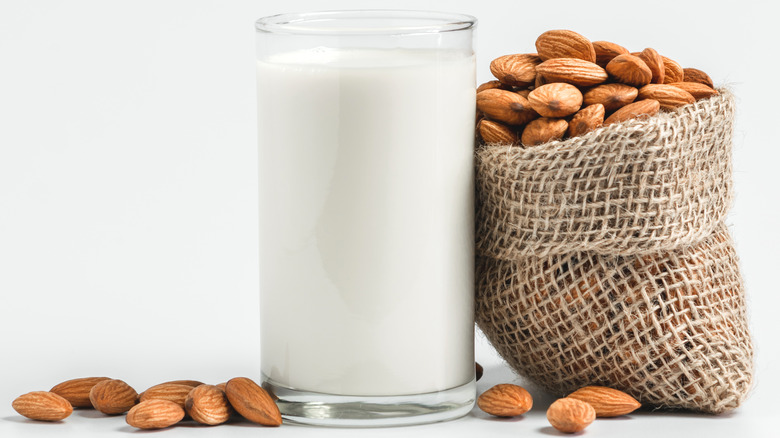Is Almond Milk Actually Good For You?
Almond milk is a plant-based alternative to cow's milk, made primarily of almonds and water. That said, some brands may include additional ingredients (some good and some bad). Health points out that there is no single way to make almond milk, and that results in variations in many of the products you see on the store shelves. Some may contain more almonds than others, which may impact their nutritional value. Others might contain sugar, salt, gums, added flavors, and emulsifiers (via Healthline). You may even find that certain brands contain added vegetable oils, so it pays to read the label (via Health).
Because it isn't made from animal products, almond milk is a suitable option for vegans and vegetarians. It is also lactose-free, making it a good alternative for those who do not tolerate lactose well. While almond milk is a popular substitute for other milk, is it good for you?
Almond milk is generally healthy
Almonds are naturally high in vitamin E, which means that almond milk also contains some of the nutrient. Vitamin E is an antioxidant, meaning it helps your body fight cancer and other diseases (via Mayo Clinic). Your almond milk may be fortified with other nutrients, such as calcium and vitamin D, both of which are needed for bone health, Healthline reports. Unsweetened almond milk has fewer calories than sweetened versions. One cup has about 30 to 35 calories per one-cup serving, compared to one cup of dairy milk, which contains around 150 calories, per MedicineNet.
While almond milk is good for most people, it does not contain much protein. In addition, unless it is fortified with calcium, it won't contain as much of the mineral as cow's milk. For this reason, it's important to add other sources of protein and calcium to your diet. Healthline also explains that because milk can prevent the absorption of iron, it is not recommended for babies. In addition, if you are allergic to tree nuts, you should avoid almond milk.


